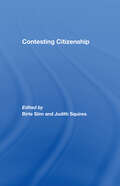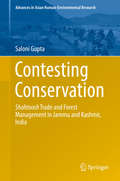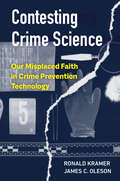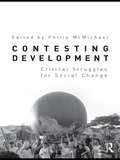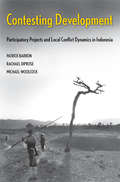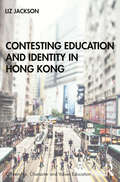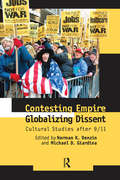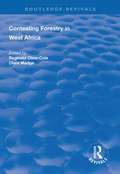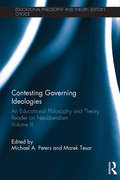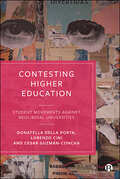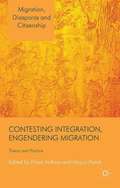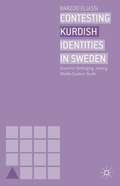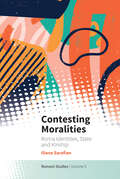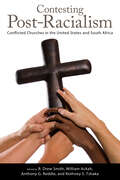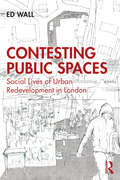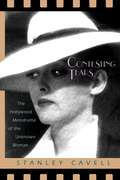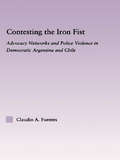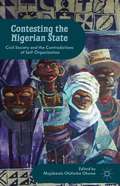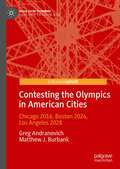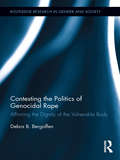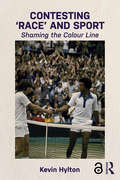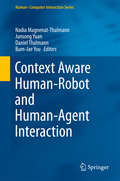- Table View
- List View
Contesting Citizenship
by Judith Squires Birte SiimThis new book shows how citizenship, and its meaning and form, has become a vital site of contestation. It clearly demonstrates how whilst minority groups struggle to redefine the rights of citizenship in more pluralized forms, the responsibilities of citizenship are being reaffirmed by democratic governments concerned to maintain the common political culture underpinning the nation. In this context, one of the central questions confronting contemporary state and their citizens is how recognition of socio-cultural ‘differences’ can be integrated into a universal conception of citizenship that aims to secure equality for all. Equality policies have become a central aspect of contemporary European public policy. The ‘equality/difference’ debate has been a central concern of recent feminist theory. The need to recognize diversity amongst women, and to work with the concept of ‘intersectionality’ has become widespread amongst political theory. Meanwhile European states have each been negotiating the demands of ethnicity, disability, sexuality, religion, age and gender in ways shaped by their own institutional and cultural histories. This book was previously published as a special issue of Critical Review of International Social & Political Philosophy (CRISPP).
Contesting Conservation
by Saloni GuptaThis book explores today’s changing intellectual climate, wherein understanding politics at different levels from global to local is considered mandatory in order to appraise the outcome of nature conservation interventions. By carefully examining two such processes – the ban on shahtoosh trade and the ‘National Afforestation Programme’ in the Indian state of Jammu and Kashmir, the book reveals how these processes are influenced by politics at different levels – from their introduction at the macro-level to their implementation at the micro-level – and in turn become coloured by the agendas and interests of the various stakeholders involved. Throughout the book, one priority is to give a voice to the poor resource-users who have been traditionally dependent on wildlife and forest resources for mere subsistence. Yet, these same people are who bear the brunt of nature conservation costs, rather than those actors who are responsible for the most serious violations in pursuit of greater profits. Contemporary Environmental Sociology is chiefly characterised by its focus on power relations in resource conservation and management. In ‘political ecology’ literature, too – especially after recognising the paradoxes and limitations of approaches such as ‘sustainable development’, ‘sustainable livelihoods’ and ‘community based natural resource management’ – there is a growing concern for critical analyses of multi-level politics in connection with nature conservation. The purpose of the book is not to challenge the gravity of environmental concerns, but to question the dominance of conservation interests over the subsistence needs of local communities, and to strike a balance between environmental and social justice. It argues that, unless and until more just accountability for the affected populations is ensured, conservation policies are unlikely to meet the goals of sustainable resource management. Given its critical engagement with human-nature conflicts in Jammu and Kashmir, the book offers a unique resource for students and scholars of Environmental Sociology, Political Ecology, Natural Resources Management, Conflict Studies and Human Rights Studies.
Contesting Crime Science: Our Misplaced Faith in Crime Prevention Technology
by James C. Oleson Ronald KramerIn this eye-opening critique, Ronald Kramer and James C. Oleson interrogate the promises of crime science and target our misplaced faith in technology as the solution to criminality. This book deconstructs crime science's most prominent manifestations—biological, actuarial, security, and environmental sciences. Rather than holding the technological keys to crime's resolution, crime sciences inscribe criminality on particular bodies and constitute a primary resource for the conceptualization of crime that many societies take for granted. Crime science may strive to reduce crime, but in doing so, it reproduces power asymmetries, creates profit motives, undermines important legal concepts, instantiates questionable practices, and forces open new vistas of deviant activity.
Contesting Development: Critical Struggles for Social Change
by Philip McMichaelAt a time when the development promise is increasingly in question, with dwindling social gains, the vision of modernity is losing its legitimacy and coherence. This moment is observable through the lens of critical struggles of those who experience disempowerment, displacement and development contradictions. In this book, case studies serve as an effective means of teaching key concepts and theories in the sociology of development. This collection of cases, all original, never previously published and with framing essays by Phillip McMichael, has been written with this purpose in mind. An important additional feature is that the book as a whole reveals the limiting assumptions of development and suggests alternate conditions of possibility for social existence in the world today. In that sense, the book pushes the boundaries of "thinking about development" and makes an important theoretical contribution to the literature.
Contesting Development: Participatory Projects and Local Conflict Dynamics in Indonesia
by Patrick BarronThis path-breaking book analyzes a highly successful participatory development program in Indonesia, exploring its distinctive origins and design principles and its impacts on local conflict dynamics and social institutions.
Contesting Education and Identity in Hong Kong (Citizenship, Character and Values Education)
by Liz JacksonThis text examines the intersection of youth civic engagement, identity, and protest in Hong Kong, through the lens of education. It explores how education and identity have been protested in Hong Kong, historically and today, and the mark that such contestations have left on education. Many people, particularly outside Hong Kong, were astonished by youth participation in the Umbrella Movement of 2013–2014, and the anti-extradition law protests in 2019. These protests have caused people to consider what has changed in Hong Kong over time, and what education has to do with youth civic engagement and political expression. This book provides an academic, theoretically oriented perspective on the intersection of youth identity and education in Hong Kong. Coming from an educational (and philosophical) orientation, Jackson focuses on areas where greater understanding, and greater potential agreement, might be developed, when it comes to education. This book will be of interest to educational policy makers, curriculum specialists, and educational scholars and students in liberal studies, social studies, civic education, comparative and international education, multicultural education, and youth studies.
Contesting Empire, Globalizing Dissent: Cultural Studies After 9/11
by Norman K. Denzin Michael D. Giardina"Denzin and Giardina have brought together the works of leading cultural critics who have given cultural studies a global framework that meets our need to examine the governing strategies of the military, the economy, the media, and educational elites...This is a must-read for those who want cultural studies to really matter in the present moment." Patricia Ticineto Clough Contesting Empire, Globalizing Dissent: Cultural Studies after 9/11 is a landmark text. Leading scholars from cultural studies, education, gender studies, and sociology reposition critical cultural studies research around the goals of moral clarity and political intervention. Chapters range in focus from neoliberalism and democracy to America's war on kids and the cultural politics of national identity.
Contesting Forestry in West Africa (Routledge Revivals)
by Reginald Cline-Cole Clare MadgeThis title was first published in 2000. This study looks at the contestation of forestry in West Africa, taking into account historical considerations, cultural negotiations and environmental issues.
Contesting Governing Ideologies: An Educational Philosophy and Theory Reader on Neoliberalism, Volume III (Educational Philosophy and Theory: Editor’s Choice)
by Michael A. Peters Marek TesarContesting Governing Ideologies is the third volume in the Educational Philosophy and Theory: Editor’s Choice series and represents a collection of texts that provide a cutting-edge analysis of the philosophy and theory of performances of neoliberal ideology in education. In past decades, philosophy of education has provided a critical commentary on problematic areas of neoliberal ideology. As such, this collection argues, philosophy of education can be considered as an intellectual struggle that runs through the contemporary ideological landscape and has roots that go back to the Enlightenment in its traditions. This book covers multiple philosophical and educational theoretical perspectives of what we know about the ideology of neoliberalism, and many of its practices and projects. Neoliberalism is difficult to define, but what is certain is that it has significantly matured as a political doctrine and set of policy practices. This collection covers questions of ideology, politics, and policy in relation to the subject and the institution alike. The chapters in this book provide rich and diverse reading, allowing readers to rethink established discourses and contest ideologies, providing a thorough and careful philosophical and theoretical analysis of the story of neoliberalism over the past decades. Contesting Governing Ideologies will be key reading for academics, researchers and postgraduate students in the fields of philosophy of education, philosophy, education, educational theory, post-structural theory, the policy and politics of education, and the pedagogy of education.
Contesting Higher Education: Student Movements against Neoliberal Universities
by Donatella Della Porta Lorenzo CiniUsing new research on higher education in the UK, Canada, Chile and Italy, this rigorous comparative study investigates key episodes of student protests against neoliberal policies and practices in today’s universities. As well as examining origins and outcomes of higher education reforms, the authors set these waves of demonstrations in the wider contexts of student movements, political activism and social issues, including inequality and civil rights. Offering sophisticated new theoretical arguments based on fascinating empirical work, the insights and conclusions revealed in this original study are of value to anyone with an interest in social, political and related studies.
Contesting Integration, Engendering Migration
by Floya Anthias Mojca PajnikThis book aims to further the understanding of migration processes and policies in a European context with a particular focus on evaluating integration and the gendered aspects of migration, integration and citizenship. Integration is regarded as a contested concept and as entailing a variable and problematic set of discourses and practices.
Contesting International Society in East Asia
by Barry Buzan Yongjin ZhangBringing together some of the most innovative scholars in both the English School of international relations and East Asian studies, this volume investigates whether or not significant and distinct international social structures exist at the regional level represented by 'East Asia', and what this can tell us about international society both regionally and globally. The book's main finding is that the regional dispute over how its states and peoples should relate to the Western-dominated global international society makes the existence of East Asian international society essentially contested. While this regional-global social dynamic is present in many regions, it is particularly strong in East Asia. This book will appeal to audiences interested in developing English School theory, the study of East Asian international relations and comparative regionalism.
Contesting Kurdish Identities in Sweden
by Barzoo EliassiContesting Kurdish Identities in Sweden explores how young Kurdish immigrants living in Sweden experience and articulate their ideas about citizenship rights, belonging, and statehood as they are shuttled between different citizenship regimes and exclusive structures of belonging. Unlike immigrants who come to Sweden from countries where their groups are dominant, Kurds who immigrate to Sweden re-occupy a minoritized position; they do so not merely under the marginalized label of "Kurd," common in the Middle East, but under other, overlapping identity categories that are equally negative and loaded. Examining how national and ethnic conflicts in the Middle East continue to impinge on Kurdish youths' identities in Sweden, Barzoo Eliassi highlights the gulf between a rhetoric of equality and the lived experience of cultural, political, and economic subordination. He argues that, despite important theoretical deliberations about cosmopolitanism and post-nationalism, the internationalnation-state system has created a global apartheid that divides the world into nations with states and nations without, where the latter continue to be treated as anomalous and politically, legally, and socially superfluous.
Contesting Moralities: Roma Identities, State and Kinship (New Directions in Romani Studies #5)
by Iliana SarafianRoma identities have often been presented in literature as collectively constructed and in opposition to those who are not Roma. Contesting Moralities challenges these preconceptions about Roma identification by disentangling the binaries between Roma and non-Roma, state and non-state, public and private. It explores topics resonating in contemporary Romani studies that are in need of further exploration through individual perspectives, including history, activism, kinship, childhood, and gender hierarchies. The book paints a complex picture of inequality and how it is negotiated amid conflicting, ambiguous and contradictory regimes of power and moral demands, including those of state and kin.
Contesting Post-Racialism: Conflicted Churches in the United States and South Africa
by R. Drew Smith, William Ackah, Anthony G. Reddie, and Rothney S. TshakaContributions by William Ackah, Allan Boesak, Ebony Joy Fitchue, Leah Gaskin Fitchue, Walter Earl Fluker, Forrest E. Harris Sr., Nico Koopman, AnneMarie Mingo, Reggie Nel, Chabo Freddy Pilusa, Anthony G. Reddie, Boitumelo Senokoane, Rothney S. Tshaka, Luci Vaden, Vuyani Vellem, and Cobus van WyngaardAfter the 2008 election and 2012 reelection of Barack Obama as US president and the 1994 election of Nelson Mandela as the first of several blacks to serve as South Africa's president, many within the two countries have declared race to be irrelevant. For contributors to this volume, the presumed demise of race may be premature. Given continued racial disparities in income, education, and employment, as well as in perceptions of problems and promise within the two countries, much healing remains unfinished. Nevertheless, despite persistently pronounced disparities between black and white realities, it has become more difficult to articulate racial issues. Some deem "race" an increasingly unnecessary identity in these more self-consciously "post-racial" times.The volume engages post-racial ideas in both their limitations and promise. Contributors look specifically at the extent to which a church's contemporary response to race consciousness and post-racial consciousness enables it to give an accurate public account of race.
Contesting Public Spaces: Social Lives of Urban Redevelopment in London
by Ed WallThis book explores concerns for spatial justice as streets, squares, and neighbourhoods are continuously made and remade through planning processes, political ambitions and everyday activities. By investigating three sites in London that have been the focus of masterplanning, Ed Wall exposes conflicts between planning offices and private developers who direct large urban change and community groups, market traders and residents whose public lives are inseparable from their neighbourhoods being reconfigured. The book uniquely brings sociological approaches to what are often considered architectural concerns, revealing challenges as London's public spaces are designed, regulated and lived. Through in-depth research, Ed Wall identifies how uncertainty caused by large-scale urban strategies, the realisation of visual priorities, and uneven relations between private interests, public organisations and daily lives determine the public realm of global cities. This work is intended for readers interested in how the urban spaces of their cities are continually produced in competing ways—from architecture and urban studies scholars to planners and politicians.
Contesting Tears: The Hollywood Melodrama of the Unknown Woman
by Stanley CavellWhat is marriage? Can a relationship dedicated to equality, friendship, and mutual education flower in an atmosphere of romance? What are the paths between loving another and knowing another? Stanley Cavell identified a genre of classic American films that engaged these questions in his study of comedies of remarriage, Pursuits of Happiness. With Contesting Tears, Cavell demonstrates that a contrasting genre, which he calls "the melodrama of the unknown woman," shares a surprising number and weave of concerns with those comedies. Cavell provides close readings of four melodramas he finds definitive of the genre: Letter from an Unknown Woman, Gaslight, Now Voyager, and Stella Dallas. The women in these melodramas, like the women in the comedies, demand equality, shared education, and transfiguration, exemplifying for Cavell a moral perfectionism he identifies as Emersonian. But unlike the comedies, which portray a quest for a shared existence of expressiveness and joy, the melodramas trace instead the woman's recognition that in this quest she is isolated. Part of the melodrama concerns the various ways the men in the films (and the audiences of the films) interpret and desire to force the woman's consequent inaccessibility. "Film is an interest of mine," Stanley Cavell has written, "or say a love, not separate from my interest in, or love of, philosophy. " In Contesting Tears Cavell once again brilliantly unites his two loves, using detailed and perceptive musings on melodrama to reflect on philosophical problems of skepticism, psychoanalysis, and perfectionism. As he shows, the fascination and intelligence of such great stars as Ingrid Bergman, Bette Davis, and Barbara Stanwyck illuminate, as they are illuminated by, the topics and events of these beloved and enduring films.
Contesting the Corporation
by Peter Fleming André Spicer Peter Fleming André SpicerIn an age when large corporations dominate the economic and political landscape, it is tempting to think that their power goes largely unchecked. Originally published in 2007, Contesting the Corporation counters this view by showing that today's corporations are driven by political struggle, power plays and attempts to resist control. Building on a wide range of theoretical sources, Fleming and Spicer present an analysis of the different ways in which power operates within the modern workplace. They begin by building a theoretical perspective that synthesizes previous investigations of power and resistance, identifying struggle as a key concept. Each chapter illustrates a different dimension of workplace struggle through an array of original empirical studies relating to sexuality, cynicism, new social movements and new-wave trade unionism. The book concludes by demonstrating that social justice claims underlie even the most innocuous forms of resistance, helping to transform some of the largest modern corporations.
Contesting the Iron Fist: Advocacy Networks and Police Violence in Democratic Argentina and Chile
by Claudio FuentesThis work analyzes the interactions and international connections of the "civil rights" and "pro-order" coalitions of state and societal actors in the two countries. The author demonstrates that in democratizing contexts, protecting citizens from police abuse and becomes part of a debate about how to deal with issues of public safety and social control and of perceived trade-offs between liberty and security.
Contesting the Nigerian State: Civil Society and the Contradictions of Self-Organization
by Mojúbàolú Olúfúnké OkomeIn public choice theory, the received wisdom has long been that self-organization is an impediment to collective action, whether via the tragedy of the commons or a Hobbesian scenario in which self-interest produces social conflict rather than cooperation. Yet as this fascinating collection shows, self-organization and state-society relations have been much more complicated in the context of contemporary Nigerian politics. Given the absence or unwillingness of the Nigerian state to provide essential services, entire communities have had to band together to repair roads, build health centers, and maintain public utilities, all from levies. The successes, failures, and ongoing challenges faced by Nigerian society provide valuable insights into the state's capacity, its relationship with civil society, and the social, economic, and political well-being of its citizens.
Contesting the Olympics in American Cities: Chicago 2016, Boston 2024, Los Angeles 2028 (Mega Event Planning)
by Matthew J. Burbank Greg AndranovichThis book examines the changing nature of opposition to bidding for and hosting the Olympic Games in contemporary American cities. It explores and critiques the process by which cities bid for the Olympics in the current context of the International Olympic Committee’s changing bid requirements and from the social justice perspectives of Olympics opponents. Using detailed case studies of the Olympic bids in Chicago, Boston, and Los Angeles, it shows how opposition to bidding for and hosting the Olympics has changed dramatically in American cities.
Contesting the Politics of Genocidal Rape: Affirming the Dignity of the Vulnerable Body (Routledge Research in Gender and Society)
by Debra B. BergoffenRape, traditionally a spoil of war, became a weapon of war in the ethnic cleansing campaign in Bosnia. The ICTY Kunarac court responded by transforming wartime rape from an ignored crime into a crime against humanity. In its judgment, the court argued that the rapists violated the Muslim women’s right to sexual self-determination. Announcing this right to sexual integrity, the court transformed women’s vulnerability from an invitation to abuse into a mark of human dignity. This close reading of the trial, guided by the phenomenological themes of the lived body and ambiguity, feminist critiques of the autonomous subject and the liberal sexual/social contract, critical legal theory assessments of human rights law and institutions, and psychoanalytic analyses of the politics of desire, argues that the court, by validating women’s epistemic authority (their right to establish the meaning of their experience of rape) and affirming the dignity of the vulnerable body (thereby dethroning the autonomous body as the embodiment of dignity), shows us that human rights instruments can be used to combat the epidemic of wartime rape if they are read as de-legitimating the authority of the masculine autonomous subject and the gender codes it anchors.
Contesting the Postwar City
by Eric Fure-SlocumFocusing on mid-century Milwaukee, Eric Fure-Slocum charts the remaking of political culture in the industrial city. Professor Fure-Slocum shows how two contending visions of the 1940s city - working-class politics and growth politics - fit together uneasily and were transformed amid a series of social and policy clashes. Contests that pitted the principles of democratic access and distribution against efficiency and productivity included the hard-fought politics of housing and redevelopment, controversies over petty gambling, questions about the role of organized labor in urban life, and battles over municipal fiscal policy and autonomy. These episodes occurred during a time of rapid change in the city's working class, as African-American workers arrived to seek jobs, women temporarily advanced in workplaces, and labor unions grew. At the same time, businesses and property owners sought to re-establish legitimacy in the changing landscape. This study examines these local conflicts, showing how they forged the postwar city and laid a foundation for the neoliberal city.
Contesting ‘Race’ and Sport: Shaming the Colour Line
by Kevin HyltonIn the decade since Kevin Hylton’s seminal book ‘Race’ and Sport: Critical Race Theory was published, racialised issues have remained at the forefront of sport and leisure studies. In this important new book, Hylton draws on original research in contemporary contexts, from sport coaching to cyberspace, to show once again that Critical Race Theory is an insightful and productive tool for interrogating problematic social phenomena. Inspired by W.E.B. Du Bois’ statement that "the problem of the twentieth century is the problem of the colour line", this book sheds a critical light on the way sport perpetuates racism, while identifying opportunities to challenge its insidious presence. Exploring and explaining the ways in which notions of ‘race’ are expressed and contested at individual, institutional and societal levels, it addresses key topics such as whiteness, diversity, colourblindness, unconscious bias, identity, leadership, humour and discourse to investigate how language can be used as a device for resistance against racism in sport. Contesting ‘Race’ and Sport: Shaming the Colour Line is vital reading for all sport studies students, academics and those with an interest in race, ethnicity and society.
Context Aware Human-Robot and Human-Agent Interaction (Human–Computer Interaction Series)
by Daniel Thalmann Nadia Magnenat-Thalmann Junsong Yuan Bum-Jae YouThis is the first book to describe how Autonomous Virtual Humans and Social Robots can interact with real people, be aware of the environment around them, and react to various situations. Researchers from around the world present the main techniques for tracking and analysing humans and their behaviour and contemplate the potential for these virtual humans and robots to replace or stand in for their human counterparts, tackling areas such as awareness and reactions to real world stimuli and using the same modalities as humans do: verbal and body gestures, facial expressions and gaze to aid seamless human- computer interaction (HCI). The research presented in this volume is split into three sections: User Understanding through Multisensory Perception: deals with the analysis and recognition of a given situation or stimuli, addressing issues of facial recognition, body gestures and sound localization. Facial and Body Modelling Animation: presents the methods used in modelling and animating faces and bodies to generate realistic motion. Modelling Human Behaviours: presents the behavioural aspects of virtual humans and social robots when interacting and reacting to real humans and each other. Context Aware Human-Robot and Human-Agent Interaction would be of great use to students, academics and industry specialists in areas like Robotics, HCI, and Computer Graphics.
